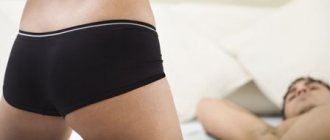Sometimes the delicate female body brings surprises. It happens that a pre-thought out and planned vacation is overshadowed by sudden regulations. Don’t despair - modern intimate hygiene tools allow you to swim without harm to your health, even on “red days”. So your period at sea won’t ruin your vacation.
In this article we will look at why doctors advise to refrain from sea swimming and what the consequences may be. We’ll show you how to reliably protect yourself so that you can swim in the sea comfortably during your period. We will tell you which pharmacy and folk remedies can delay your periods and reduce their abundance.
Is it safe to swim in the sea during menstruation?
The menstrual cycle can go wrong for various reasons, this can be a reason for menstruation to begin during rest. Also, not every woman is able to plan her trip depending on her cycle. It’s worth figuring out whether it’s possible to swim in the sea while on your period.
Spending time on the beach during menstruation is accompanied by many problems, since there are a number of restrictions for women during this period.
It is not recommended to stay in the sun for a long time, and many gynecologists prohibit swimming.
Discomfort also lies in the fact that it is difficult for a woman to choose a suitable swimsuit for a beach holiday.
If, despite the recommendations of gynecologists, you want to swim, you need to take into account all possible consequences. In order to minimize them, there are a number of rules:
- It is strictly forbidden to swim without hygiene products; it is recommended to combine a tampon with a pad. Be sure to choose personal care products that are highly absorbent.
- After swimming, you must take a shower or bath, as well as change hygiene products and underwear.
- For those taking hormonal contraceptives, it is possible to slightly adjust their menstrual cycle. To do this, you must not stop taking the pills and drink them as usual. This method will help delay menstruation by two to three days. It is not recommended to take the drug for longer, as this can result in serious health problems.
- When choosing a place for swimming, you should give preference to the pool rather than the sea or river. The water in the pools is disinfected, this significantly reduces the likelihood of infection and bacterial contamination. At the same time, the use of hygiene products is also mandatory.
- During the first days, swimming in a pond, sea or river is strictly prohibited. These days the bleeding is heavy, and the microflora is weakly protected. In the first days, the chance of infection is much higher.
Women who have been diagnosed with various gynecological diseases, as well as an inflammatory process, are not recommended to swim throughout the entire duration of menstruation. Infection or bacteria is the most dangerous for them, as it entails serious complications. If these rules are neglected, infection is fraught with serious illnesses; in particularly difficult cases, it can affect reproductive function and lead to infertility.
Before going to the sea, it is advisable to consult a gynecologist. Only he can accurately answer whether it is possible to swim during menstrual bleeding. For some gynecological diseases, swimming during menstruation is strictly prohibited in order to avoid serious complications.
How to delay your period?
In some cases, it is important for a woman to increase the duration of her cycle, thereby using the necessary time, for example, to go on vacation at sea.
Moreover, if the reproductive function is not realized, then the use of these methods is extremely unfavorable for the further implementation of the reproductive function.
Hormonal drugs
One of the most reliable ways to lengthen the menstrual cycle is to use hormonal drugs.
Properties of hormonal drugs:
- They help maintain hormonal stabilization. It is due to these drugs that the duration of the menstrual cycle changes and the rate of maturation of endometrial tissue decreases.
- The advantage of this method is the use of monophasic hormonal agents. They help maintain stable hormonal levels throughout the entire period of use. In order to delay your period at sea, you just need to increase the time of admission to the required time.
- When using three or two-phase remedies for menstruation at sea, it is necessary to change all hormone levels.
- As soon as the reception is completed, your period will come. It is the medications that provide more accurate results and ensure a delay in menstruation at sea.
Traditional methods
Traditional methods can also help delay the onset of menstruation at sea.
These include:
Use of parsley decoction.
To do this, its roots are brought to a boil in clean drinking water and consumed for several days in a volume of 100 ml, twice. It is with a duration of therapy of at least 5-10 days that a change in the cycle is possible, but menstruation can only be delayed by a few days using this method. As a rule, this duration is no more than 2-3 days.- Another less effective and at the same time quite dangerous method is the use of nettle decoction. In such a case, it is necessary to use nettle decoction in various forms of preparation. The duration of therapy should not exceed 3-5 days, since the risk of developing disturbances in hemostasis, manifested by blood thickening and possible formation of blood clots, increases significantly.
- Citric acid can also be used to delay the onset of menstruation at sea. To do this, you need to consume a large amount of it a few days before the expected date of your period. To do this, you can use either fresh lemon juice or ascorbic acid in high dosage. This method does not guarantee that menstruation will begin later; the high probability depends on the initial hormonal background.
What happens in the body
If your period began while on vacation at sea, experts recommend refraining from swimming for this period. From a medical point of view, this ban is quite justified, since during menstrual bleeding, serious changes occur in a woman’s body. Bathing during menstruation often leads to serious problems. This is explained by the fact that on ordinary days the genitals are protected by a mucous substance, which avoids the penetration of pathogenic bacteria. When your period begins, the mucus plug disappears.
When the cervical canal expands, it becomes much more vulnerable, which increases the likelihood of penetration of harmful microorganisms. When an inflammatory process occurs, endometritis often develops, causing serious damage to women's health. In addition, swimming in the sea during menstrual bleeding is fraught with the following problems:
- Fungal infection. Although sea water has antibacterial properties, at temperatures above 25 degrees fungal microflora begins to develop in it.
- Infection with E. coli. E. coli is most often found in sand, so it can penetrate along with sand particles that remain on the swimsuit. In order to minimize this likelihood, it is necessary to change your swimming trunks as often as possible, and also, if possible, not to sit on bare sand.
- Thrush disease. The likelihood of contracting thrush remains not only immediately during bleeding, but also several days after it. In order to avoid this, it is forbidden to stay in a wet swimsuit for a long time. Gynecologists recommend stocking up on several swimsuits and changing them as often as possible.
- Weakness during menstruation
- What does bloating during menstruation mean?
- Diarrhea during menstruation - the cause of diarrhea
- What to do if your period falls on New Year's holidays
Watch this video on YouTube
The menstrual cycle can be disrupted for many reasons, so every woman should be prepared for the possibility of experiencing menstruation during a beach holiday. If you take into account all the recommendations and restrictions of doctors, then your vacation at sea will not be overshadowed and will not bring serious discomfort. And most importantly, if all the rules are followed, the possibility of developing various gynecological diseases is minimized.
If the menstrual cycle does not return for a significant period of time, and additional symptoms appear in the form of itching, burning or severe pain, you must immediately contact a medical facility. With the help of special diagnostic measures, the doctor will be able to make the correct diagnosis and prescribe therapy aimed at restoring the menstrual cycle and the woman’s health in general.
Critical days began after a trip to the sea
A delay in menstruation after a vacation at sea is a common phenomenon that many women experience. Most often, irregularities in the menstrual cycle after a vacation do not pose anything terrible for health; it may be due to changes in hormonal levels, which are caused by a change in environment. Also, delayed menstruation after a trip to the sea may occur for the following reasons:
- Acclimatization. Changes in the menstrual cycle can occur even without traveling to another area; they occur due to the change of season, as the temperature changes. Menstruation may change its usual duration, this is due to adaptation to the new temperature regime.
- Long journey. If the vacation took place in similar climatic conditions, then the delay may be caused by a long journey, which is stressful for the body. When moving, the hormone melatonin, which is responsible for normal sleep and rest, is produced in a smaller volume. In such conditions, the woman’s body is exposed to stress factors.
- Changes in diet. If during vacation a woman adhered to a healthy diet, namely, consumed a large amount of fresh fruit, then upon arrival and returning to her usual diet, the body is also subject to stress. In this case, the delay in menstruation will not be prolonged, and the body will quickly adapt.
- Insufficient physical activity. If the vacation was active, but in ordinary life a woman does not pay enough attention to physical activity, then this can provoke a delay in menstruation. Also, if a woman usually leads an active lifestyle, and rest is limited to lying on the beach, this will affect her hormonal levels.
Menstrual irregularities after a holiday at sea can be considered quite normal. Since the reasons causing this disorder most often do not pose a threat to a woman’s health.
On vacation, the usual rhythm of life is disrupted, which can affect hormonal levels. But the body adapts quite quickly, so the delay should not be too long.
If your period after vacation acquires uncharacteristic symptoms, it is recommended to immediately consult a specialist. Too scanty or heavy periods, as well as severe pain, itching and burning may indicate the presence of an infectious or inflammatory process. If you do not contact a medical facility in a timely manner, this entails serious consequences that are difficult to treat. A sharp deterioration in health, the appearance of nausea and symptoms of general intoxication should alert you. Such symptoms may occur due to climate change, but in some cases they indicate the onset of a serious illness.
Gynecological diseases pose a serious threat to women. They affect not only her health, but also almost all pathological changes in the gynecological area have a negative impact on reproductive function. Infection and infection during swimming with menstruation is one of the possible causes of the development of an inflammatory or infectious process. Failure to follow the rules on vacation during critical days, neglecting to take care of personal hygiene almost always lead to serious consequences. It is much easier to prevent them than to engage in long and difficult treatment, which is often not without complications.
Daily routine and proper nutrition during rest during menstruation
During the holidays, if there are critical days, it is recommended to take a large amount of nutrients corresponding to the diet.
- Nutrition should be balanced. You can eat as many plant-based foods as possible, such as fruits and vegetables.
- The drinking regime must be determined taking into account the weather; if the weather is hot, it is recommended to drink more liquid. In this case, you should avoid drinking alcoholic beverages.
Observe the following precautions
If a woman decides to swim during her period, she needs to know and follow all precautions. In order to avoid an infectious or inflammatory process, you must adhere to the following rules:
- Swimming is permitted only with the use of hygiene products. Be sure to use a tampon, which, if possible, can be combined with a pad. After bathing, you must immediately change hygiene products.
- Swimming in the sea is allowed for no more than 10-15 minutes. It is highly not recommended to be in the water any longer, otherwise using a tampon becomes useless, which means that the chance of contracting an infection or picking up a bacteria increases sharply.
- After being in sea water, be sure to take a shower and rinse your genitals.
- It is permissible to go into the water 2-3 days after the start of menstruation, since in the first days the discharge is especially strong. Also, the first days are often accompanied by severe pain and general malaise; being in water or under the scorching sun can significantly worsen a woman’s condition.
- If swimming is not planned, then for reliability it is recommended to use pads with a level of 4 drops or more. Such pads are noticeable in most swimsuits, so it is advisable to use a pareo or any other cover-up.
- For bathing women, a procedure such as douching is recommended. It is better to choose the means for this together with your doctor; the use of anti-inflammatory herbs is allowed. This procedure will help reduce the risk of possible infection.
Compliance with these rules will help you spend your vacation comfortably even when it is accompanied by menstruation. In addition to swimming, you must not forget about other precautions. For example, prolonged exposure to the sun is prohibited. During critical days, a woman becomes much more susceptible, and the likelihood of sunstroke increases. If sunstroke occurs, it can be extremely difficult against the backdrop of menstruation. Exposure to sunlight also causes increased bleeding.
It is worth considering that during menstruation, the tan spreads unevenly or does not appear at all. This is due to the action of melanin, the production of which is reduced during menstrual periods.
In addition, you need to drink plenty of water, and, if possible, take mineral complexes or replace them with fresh fruit.
It is forbidden! But I really want to!
We found out the opinion of doctors regarding whether it is possible to swim in the sea during menstruation. But, unfortunately, many women do not always listen to him. And how can you resist plunging into the warm and alluring sea waves on a hot summer day on a hot beach?
If you cannot deny yourself the pleasure of sea swimming during your period, then try to take all the necessary personal safety measures so as not to catch any infection and then regret your reckless action, ruining your entire vacation. We invite you to use our tips to make swimming in open water during menstruation as safe as possible:
- Immediately before going into the water, place a new hygienic tampon with maximum absorption power into the vagina;
- As soon as you get out of the water, immediately remove it and throw it away;
- Take a shower and wash thoroughly using antiseptic soap or gel;
- Wear clean underwear or a swimsuit.
However, on days when you experience particularly heavy bleeding, you should still refrain from swimming. And on the remaining days of menstruation, you should bathe quickly enough. Be patient for a few days, and then enjoy sea water to the fullest without worries or fears!
Women who have a weakened immune system or have chronic gynecological diseases and who do not want to give up swimming in open water should find out from their doctor in advance whether it is possible to swim in the sea during menstruation and how to protect themselves. In these cases, the doctor may advise them to douche the vagina with a solution of some mild antiseptic immediately after bathing and removing the tampon.
Which swimsuit to choose
If menstruation occurs at sea, every woman wonders what to do. In addition, the question arises of how to choose the right swimsuit. Even if all the rules are followed, stains may appear that others will notice. To prevent this from happening, you should consider several features when choosing a swimsuit:
- It is best to give preference to dark shades - black or blue; dark purple is also allowed. It is on these shades that the stains will be least noticeable. If desired, it is possible to combine: the top of the swimsuit can be absolutely any color, but the swimming trunks must be dark.
- It is recommended to use beach cover-ups. They can be not only a stylish accessory that decorates an image, but also a completely functional thing that will protect from the sun's rays.
- When choosing the shape of swimming trunks, you should pay attention to classic ones or in the form of shorts. A thong would be inappropriate even if a woman is using one tampon without a pad. Firstly, thongs can highlight the use of hygiene products. Secondly, they provide the least protection against infections and bacteria.
- Swimming shorts should be chosen in loose models that will not restrict movement. Excessively tight swimming trunks can move a tampon or pad out of place, and this will not do without staining.
- It is better to use sanitary pads without wings, as they are very noticeable under any type of swimming trunks.
- It is recommended to wear skirts or tunics; such clothes will help you feel comfortable in any situation. In addition, a beautiful beach skirt perfectly decorates the entire look, adding zest to it.
Tampons
Constant disagreements about the danger tampons pose to the reproductive system have not ceased for a long time. Of course, if a woman constantly uses this product, then the risk of developing pathogenic bacteria in the vagina increases significantly, however, if it helps only in rare cases, then there are no problems.
To prevent bacteria from developing in the vaginal environment, you need to change the tampon every two hours. This is easy to do even on a public beach. There are changing cabins everywhere. Away from prying eyes, the necessary manipulations are performed, and the woman continues to rest.
The use of these hygiene products is allowed even for virgins. They need to purchase a package for themselves that says mini.









